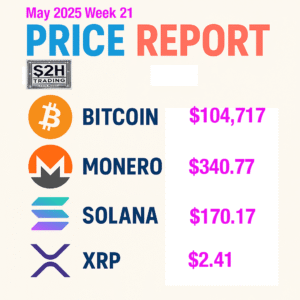by Scott Emick
In the past few days, both Bitcoin (BTC) and Ethereum (ETH) have experienced notable price declines. Let’s take a closer look at their recent performance:

Several factors have contributed to this downturn:
- Stronger-than-Expected Economic Data: Recent U.S. employment reports have surpassed expectations, indicating a robust job market. In December, 256,000 jobs were added, significantly higher than the anticipated 153,000, and unemployment fell to 4.1% from 4.2%. This has led to concerns that the Federal Reserve may delay interest rate cuts, maintaining higher rates for a longer period. Higher interest rates can reduce the appeal of riskier assets, including cryptocurrencies.
- Federal Reserve’s Monetary Policy Outlook: Federal Reserve Chair Jerome Powell’s recent comments suggest a slowdown in the rate-cutting cycle for 2025. This hawkish stance has dampened investor sentiment, contributing to the decline in crypto prices.
- Institutional Investor Activity: There have been significant outflows from spot Bitcoin exchange-traded funds (ETFs), indicating a cautious approach among institutional investors. This trend reflects broader market apprehensions about the future trajectory of cryptocurrency valuations.
- Broader Market Dynamics: The overall cryptocurrency market has been affected by these macroeconomic factors, leading to declines across various digital assets, including Ethereum and other altcoins. The interconnected nature of the crypto market means that significant movements in Bitcoin often influence the performance of other cryptocurrencies.
It’s important to note that, despite these recent declines, Bitcoin remains up over 100% for the year, driven largely by expectations of favorable crypto regulations under the incoming Trump administration.
Investors should continue to monitor economic indicators and central bank policies, as these will likely play a significant role in shaping the future performance of cryptocurrencies.


January 13th, 2025






